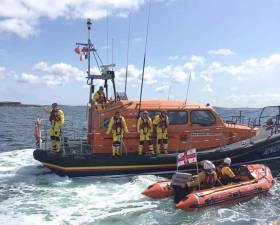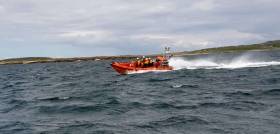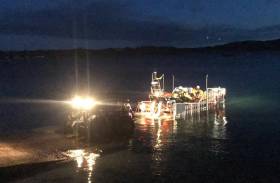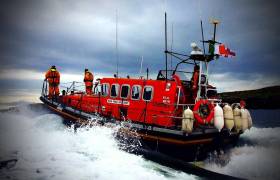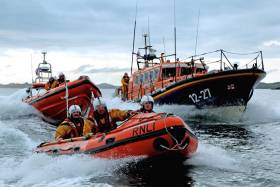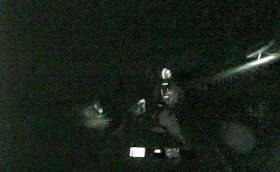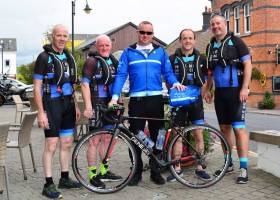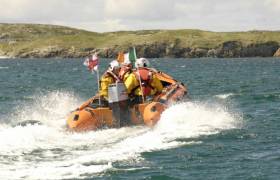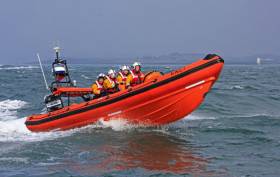Displaying items by tag: Clifden
RNLI Clifden Welcomes its First Shannon-Class Lifeboat
North Connemara’s Clifden has become the first west coast RNLI station to receive a new Shannon-class lifeboat writes Lorna Siggins.
The all-weather Shannon, which was designed by an Irish engineer and is the first RNLI class to be named after an Irish river, was given a warm welcome by several hundred people at Clifden Quay yesterday.
Named the Brianne Aldington, the 13-metre Shannon reduces response times to call-outs, as it has a top speed of 25-knots. It replaces the Mersey-class 15 knot vessel at Clifden and represents a 2.4 million euro investment by the RNLI in the west coast.
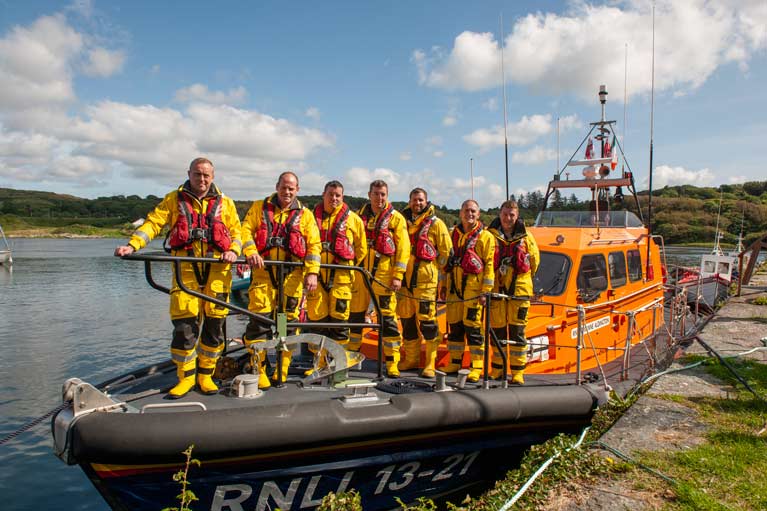
The Shannon was designed by Derry man Peter Eyre who as a child was rescued by Lough Swilly RNLI in Donegal. It has a maximum speed of 25 knots and an endurance of 250 nautical miles.
It is propelled by waterjets, rather than propellers, and it can be driven directly onto a beach for recovery.
The vessel can be recovered directly from the beach by her launch and recovery tractor. Once winched up from the beach, the tractor’s carriage revolves 180 degrees so that the lifeboat is repositioned for relaunching.
The 24-person voluntary crew at Clifden includes a husband and wife and a father and son, while two of its four coxswains are brothers.
Clifden RNLI coxswain James Mullen recalled yesterday how the station received its first all-weather craft three years ago and was thrilled then.
“ However, with the arrival of the Shannon, we have 21st-century lifeboat design and technology. Bringing her home to Clifden from Poole was one of my proudest moments. As we rounded Loop Head we hit a bit of weather and we really made her dance,” he said.
“ The ergonomic seats bear the force of the impact of the lifeboat hitting the waves, and the improved communications technology means the crew can talk to each other by linked headsets and can hear each other above the noise and receive information directly from the Coast Guard,” Mr Mullen said.
The Clifden crew have trained intensively since May and will consolidate this off the Connemara coast before the Shannon is declared on service and the Mersey is retired. The former lifeboat will be sold on to a charity.
The RNLI says the first planned outing for the new lifeboat is to visit the nearby island communities on Inishbofin and Inishturk.
The new vessel left RNLI headquarters in Poole for Clifden on July 24th for its delivery run across the Irish Sea, crewed by two coxswains, David Barry and Alan Pryce, two mechanics, Thomas Davis and Andrew Bell and navigator Owen Hayes.
There are currently two Shannon-class lifeboats at Lough Swilly in Donegal and Clogherhead, Co Louth, and a relief vessel at the Wicklow station.
Clogherhead received its Shannon-class in early June. The vessel was funded through a generous legacy by a Wexford farmer, Mr Henry Tomkins, who was a lifelong supporter of the RNLI. Mr Tomkins stipulated that a lifeboat be named after former Arklow RNLI coxswain Michael O’Brien, his lifelong friend.
Clifden RNLI Lifeboat Launches Twice On Busy Saturday
The volunteers of Clifden RNLI lifeboat launched twice yesterday on what was a busy day for the crew.
At approximately 1.28pm Clifden’s All Weather Lifeboat Fisherman’s Friend was tasked to assist with a medical evacuation from Inishbofin Island. The Lifeboat set off under command of Coxswain David Barry with Mechanic Andrew Bell, Navigator Alan Pryce and crew Chris Nee and Alvin Bell. The Coastguard Helicopter R118 airlifted the casualty to Castlebar hospital and the lifeboat wasn’t eventually required for the medivac but was available if required as ever.
Not long after one launch came another. This time, the Coast Guard requested the call out to reports of two persons potentially cut off by the tide on Arduilleanisland in Mannin Bay, approximately four nautical miles south of Clifden.
Clifden Lifeboat Operations Manager John Brittaintasked the station’s Atlantic 85 to respond. The quick response from the Atlantic 85 had the crew on scene within 10 minutes, where they quickly established that this had been a false alarm with good intent. The persons on the island were safe and well and had a boat to return ashore after their trip. Assisting at the station for both launches were Neil Gallery, Kenny Flaherty, Ian Shanahan and James Mullen.
Speaking after the second launch, volunteer Coxswain and Helm Alan Pryce said ‘The dedication and selflessness of the crew is really evident during the busy summer period where the crew literally drop everything to respond to the call, to launch the lifeboats and to assist as best they can.’
Clifden RNLI Rescue 3 Jet Skiers in Darkness
At 21.04 last night, Clifden RNLI’s pagers sounded to launch in response to reports of two broken down jet skis between Inishbofin and Cleggan with three people on board.
Weather conditions were favourable at the time and the Atlantic 85 inshore lifeboat launched at 21.12 under helm Daniel Whelan and crew members Chris Nee, Owen Hayes and Ian Shanahan on board.
On arrival at the scene, they found that one jet ski had broken down and when the other one had attempted to tow it, the rope had become tangled in the second jet ski’s impeller, leaving both watercraft disabled. With darkness falling, the friends alerted the Coast Guard by mobile phone and once the lifeboat arrived in scene they towed them both safely back to Derryinver Pier.
Clifden RNLI Community Safety Officer Miryam Harris said after the launch ‘This shout shows the importance of carrying a means of contacting the rescue services in case of emergencies, in this case a mobile phone. With a busy summer ahead it is worth reminding all water users to wear a personal flotation device, check their equipment, always carry a means of calling for help on your person in a waterproof cover and let someone know when you expect to return’.
Clifden Lifeboats Respond To Lone Sailor In Distress
Clifden RNLI were tasked by the Irish Coast Guard on Saturday afternoon (8 June) to a distress signal received from a personal locator beacon (PLB) registered to a 50-foot yacht that had been activated some 13 miles west of Slyne Head.
Clifden’s all-weather and Atlantic 85 lifeboats both launched along with the Aran Islands lifeboat and the Shannon-based coastguard helicopter Rescue 115.
En route the lifeboats received updated information that the lone sailor had become trapped in his generator room. The boat had rolled hard to her beam and the door slammed shut.
He had already spent approximately two hours trying to open it and was very worried as the boat was on autopilot so he activated his PLB to raise the alarm.
Shortly afterwards he managed to free himself and immediately called Clifden Coastguard to inform them that he was okay, and that he had activated his PLB as at the time he had been in grave and imminent danger as he was not in control of his boat.
The lifeboats were requested to proceed to the casualty’s location and make verbal/visual contact with the skipper. He confirmed that he had been in a perilous position when he was trapped and the boat was indeed adrift and heading towards hazardous shoreline.
He was very relieved to learn that the rescue services were coming to his aid and he then made his own way into Clifden Bay.
Coxswain James Mullen said after the launch: “This really showed the value and importance of wearing a PLB as this skipper was totally trapped aboard his own boat and in grave danger.
“Luckily, his decision to carry this vital piece of safety equipment and then to activate his PLB meant that we were able to go to his aid and thankfully a much worse scenario was avoided.”
New Clifden Lifeboat Volunteer Put To The Test In Callout To Fishing Vessel With Engine Failure
New Clifden lifeboat volunteer Ashling Sweeney has her first callout earlier this week to a fisherman whose boat drifted out to sea after engine failure.
At 3.40pm on Tuesday 4 June, Clifden RNLI was requested to launch its all-weather and inshore lifeboats to assist the nine-metre fishing vessel with one onboard just east of Turbot Island in Co Galway.
Clifden’s Atlantic 85 lifeboat Joyce King, helmed by Daniel Whelan and with four volunteer crew onboard, launched first and made good time to the fishing vessel, which was drifting south.
The fishing vessel was quickly taken under tow back to Clifden pier as Clifden RNLI’s all-weather lifeboat launched to provide backup.
Weather conditions on scene had a north-west winds of Force 5-6 with a slight sea.
Speaking following the callout, new volunteer Ashling Sweeney said: “This was my first callout for Clifden RNLI today and I was happy to gain the experience of putting my training into action.”
Around the same time on Tuesday, Youghal RNLI in East Cork were requested to launch to an eight-metre yacht adrift in the harbour with no people onboard.
The volunteer crew launched their inshore lifeboat in a moderate north westerly breeze and were with the yacht within minutes.
On arrival, the crew determined that the yacht was dragging its mooring. A crew member boarded the yacht and cut the mooring line before the crew established a tow and bought the yacht safely back to the pontoon were the coastguard were waiting to assist.
Derry Walsh, Youghal RNLI lifeboat operations manager, said: “As we approach the summer season, we would remind sailors and boat owners to ensure the appropriate safety, engine and fuel checks are completed ahead of any trip as well as ensuring vessels are safely secured on their moorings.”
Clifden Lifeboat Rescues Bull In Distress After Slip Down Steep Cliff
#Lifeboats - Volunteers from Clifden RNLI had a pre-Christmas callout to go to the aid of a bull who fell from a steep cliff near the western Connemara town on Saturday evening (22 December).
At 5pm, Clifden RNLI’s deputy launching authority Saul Joyce requested the station’s Atlantic 85 inshore lifeboat to launch to assist a local farmer whose bull had slipped down a cliff and become stuck on the shoreline below.
The area was inaccessible by road and difficult to access on foot. The farmer, three members of the public and the local vet were on scene.
Helmed by Alan Pryce and with crew members Thomas Davis, Daniel Whelan and Ian Shanahan onboard, the lifeboat was launched immediately and attended the scene around half a mile from the station.
Weather conditions at the time were favourable with a light westerly Force 1-2 breeze. The sea was flat and calm at high tide.
Crew member Davis was put ashore to assist the farmer and vet, and a plan was put in place whereby a bridle or halter was attached to the animal and passed to the lifeboat.
Under the instruction of the vet and farmer, the lifeboat gently made way astern and used the tension on the line to guide the animal off the dangerous rocks into the water.
The lifeboat crew then guided the bull as it swam to a nearby beach, where it made its way up the shore to safety.
The lifeboat stood by until all parties were safely away from the cliffs and water and then returned to base.
Speaking following the rescue, Clifden RNLI Helm Alan Pryce said: “We were happy to assist the local farmer and vet to help the bull out of the hazardous position it was in.
“We are very aware of the dangers posed by large animals that are distressed and were glad to be able to assist the farmer while also providing a safety presence to him and the individuals working with him to bring the bull to safety, on what was a dangerous and dark shore.”
Caravan Blown Off Cliff Near Clifden As Storm Ali Sweeps In
#StormAli - Emergency services were trying to access a caravan blown off a cliff near Clifden in Co Galway this morning (Wednesday 19 September) as Storm Ali sweeps across the country.
According to TheJournal.ie, a Swiss woman in her 50s staying in the caravan was found dead along the coastline below that rescuers initially having difficulty accessing.
A Status Orange wind warning is in place for all but Ireland’s south and south-eastern counties until this afternoon, with gusts in excess of 130 km/h possible in western and north-western coastal regions.
Met Éireann’s Status Orange marine weather warning advises that gales or strong gales will extend to all sea areas this morning, reaching storm force at times on Irish coastal waters from Valentia to Rossan Point to Belfast Lough and in the north Irish Sea — and up to violent storm force between Loop Head and Erris Head this morning, before and as winds veer westerly.
Updated at 6pm
#RNLI - A one-day cycling fundraiser for the RNLI is set to take place on Sunday 16 September when four cycling friends will ride 310km from Dublin to Clifden in Co Galway while wearing lifejackets for the entire trip.
Clifden RNLI’s station mechanic Robert King will cycle along with John James Flaherty, Daniel King and Ciaran Hickey of the Twelve Bens and Western Lakes Cycling Clubs.
The quartet will set off from the RNLI Regional Office in Swords on the morning of Sunday 16 September and make their way west across the Shannon to Clifden lifeboat station.
Organiser Rob King said: “Since we all share a common interest in cycling with our local clubs, we thought it would be a good idea to undertake a trip like this raising funds but also to raise awareness around water safety at the same time.
“We feel that since lifejackets are so compact nowadays that this exercise will highlight how easy it is to wear one. Our basic message is ‘If we can wear one, so can you’.”
The Lifejacket Cycling Challenge has an online donation page and you can also follow the group and see more photos and updates on Facebook.
Clifden Lifeboat Recovers Seven Cut Off By Tide
#RNLI - Clifden RNLI’s D class lifeboat Celia Mary was on exercise at Glassilaun Beach for the annual sports day on Sunday (12 August) when it was alerted to a group of people cut off by the tide.
The inshore lifeboat proceeded to Illamore Island after the alert at 3.50pm. On approaching the island, they saw a woman up to her chest in the water holding onto a child who was visibly in distress.
The six-year-old child was immediately brought onboard the lifeboat followed by her mother. Both were wet, cold, frightened and extremely happy to finally be in safe hands.
Both casualties were given survivors lifejackets and a crew member gave the child his warm helmet. Her mother had a jacket which she wrapped around her to keep the wind off.
The lifeboat crew spotted one more adult and four children stranded on top of some rocks. They were also cut off by the rising tide, but not in immediate danger.
The woman recovered to the lifeboat indicated that she was the mother of two of the children still on the rocks. The crew brought another child on board the lifeboat, placing a lifejacket and helmet on her.
After that the lifeboat proceeded to the beach where the crew collected the casualties’ belongings, leaving crew member David O’Reilly with the four still cut off by the tide.
The casualties on board the lifeboat were then returned to the safety of the shore, and went back for the remaining four. The callout was complete at 5pm and the lifeboat was ready for service from Clifden at 7pm.
Elsewhere, Arklow RNLI’s lifeboat was launched at 2.04pm yesterday (Monday 13 August) following a pager alert to a kitesurfer and windsurfer both reported to be in difficulty south of Mizen Head.
With strong tides in the area, Arklow RNLI proceeded to the scene. Upon arrival, the lifeboat crew were made aware that the casualties had made it ashore safely and the lifeboat was stood down.
Following the callout, Mark Corcoran, Arklow RNLI’s volunteer press officer and community safety officer, said: “Thanks to the quick thinking of the local beach lifeguard, our lifeboat was launched early enough to be on scene to assist if necessary.
“People should never hesitate in calling us out. Before going out people need to check the tides and weather and make themselves aware of local hazards and always carry a mean of calling for help.”
#RNLI - Portaferry RNLI’s volunteer crew were paged yesterday afternoon (Saturday 11 August) to go to the aid of two people stranded on Guns Island off Co Down.
The lifeboat launched at 3:20pm in overcast weather with good visibility and a Force 4 south-easterly wind but a rough sea state, and on arrival on scene 20 minutes later it was raining with poor visibility.
Newcastle, Bangor and Portaferry coastguard rescue teams were also in attendance, assisting from the shore.
The RNLI crew approached the scene where they rescued the two people and their dog from the island, where they were stranded after their six-metre punt got into difficultly and was destroyed on nearby rocks.
The casualties were taken to Ballyhornan Beach where they were transferred to the care of the coastguard rescue teams on shore.
Elsewhere, Clifden RNLI added to their busy August with a callout to a yacht with engine trouble both of Slyne Head on Friday afternoon (10 August).
A light Force 2 north-westerly wind made the yacht’s passage to Clifden slow going under sail alone. The Clifden lifeboat crew established a tow to Clifden Bay, which took over an hour, and the D-class lifeboat aided in mooring the yacht.
“Once on the mooring, a rope could be observed caught underneath the yachts hull and an attempt was made to release it. This proved unsuccessful but explained how the yacht had lost mechanical propulsion,” said Clifden RNLI coxswain David Barry.



























